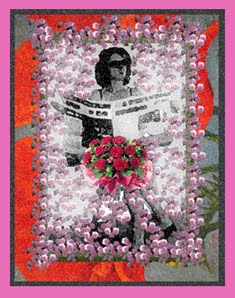The lesson got started and I announced that we were actually going to use the course book this week for a change. About five minutes later, we were off on a tangent as usual, thanks to someone asking what is the difference between "must not" and "don't have to". An especially interesting grammatical topic for my German students.
I had the brilliant idea to get the class to tell, in turn, what they had not been allowed to do as children. There were two anecdotes which I particularly liked. One was from A, who had not been allowed to play with boys, but did so secretly, because she was used to her three brothers and she was too rough with the girls. The second was from R., who said that she was not allowed to ride her father's bicycle as it was as valuable as 'diamonds', as she put it, in those early post-war years.
Of course, as is the way with forbidden fruit, she could not resist taking the bike and going off for a ride. It was a bit awkward for her, being a man's bike, and she had to sit almost side saddle, as far as I could tell from the way she described it. This made it impossible for her to brake when she found herself careering directly towards a cart piled high with cattle dung, but at least the crash landing was a soft one.
Then there was "C", who told us that she wasn't allowed to steal apples as a child. A paradoxical statement, but we understood what she meant. "You stole plenty of apples during our walk last week", piped up her regular hiking companion.
Nearly all of them completed their accounts with, "... but I did it anyway".
The second group are a pleasant bunch, but more demanding. One of them always has her dictionary at the ready and double-checks my answers to their questions, which can put a bit of a strain on my proceedings, depending how relaxed or not I am. Last week she gleefully informed me that there is a hyphen between 'back' and 'off' as in 'back-off'. I didn't burst her bubble by telling her that the hyphen is a capricious member of the punctuation dynasty, along with its sisters, cousins and aunts, and its insertion often depends purely on which way the wind is blowing.
R was insistent that another expression for "Back-off!" is, "Get off my cloud!". "Urm, not as far as I know", I said. "Yes, yes! The Rolling Stones even used it in a song", he insisted. I had to bite firmly on my tongue in order to stop myself retorting, "Yes indeed, and I could never figure out whether they were singing: 'Star fucker', or 'Fuck a star' ... what do YOU think?"
The most awkward moment for me today was when I handed a piece of paper to a relatively new member of the group and asked him to write down his phone number for me to add to my carefully-prepared class phone list. What could possibly go amiss there, you might well ask? Not a lot, except that this man's name is "Herr Quack". I kid you not. For the past few weeks since he joined the class I have managed to avoid addressing him in this way, having immediately established that we are all on first name terms here. I managed perfectly well with "Hans", thank you very much. Until today.
"What's this?", he asked, pointing accusingly at his name which I had hastily written on the budding telephone list. I peered at the incriminating piece of paper and there, written in an unusually neat hand (for administrative purposes) were the words: "Herr Duck". "Oh, you know," I babbled, "'quack - duck, duck - quack', a gal can get confused". Fortunately, the desire to prove his command of the English language to me took precedence over his indignation at my mistake. "I understand. I can tell my quacks from my ducks", he said proudly with a smile.
Well, not exactly.
But at least I'd managed to duck out of a tricky Senior Moment - and Herr Quack's briefly ruffled feathers had been smoothed.
